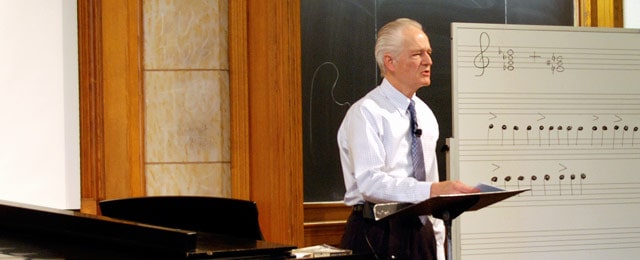In-Depth Review: Introduction to Classical Music from Yale on Coursera
Detailed review by Class Central user José Eduardo Terán on the rediscovery of his passion for classical music.
Review by José Eduardo Terán. José Eduardo Terán is an international leader, entrepreneur and promoter of academic and business opportunities in the video gaming industry. He is currently working in India as a project manager and video game developer at the DSK International Campus, considered one of the top universities in animation, industrial design and video game development in the world. Took the course? Write your own review here. Read all reviews.
“There is no culture without musical culture” – Emil Friedman
I grew up in a musical school. As students, besides the basic academic program, we had to select an instrument of our choice. I chose the violin, and for the next six years, I had a wonderful career dedicated to classical music; which, in several occasions, I had the delightful opportunity to be heard by our Professor Emil Friedman, who taught us the importance of the music in our lives.
Not only that, due to my career as a young violinist and by being surrounded by other students who also practiced an instrument, we used to participate in recitals, and we even offered concerts in our auditorium. It was a life full of joy and pleasure for the music. We liked to be watched and known as the ‘children’ of our Professor Friedman: the dream of being real musicians.
Unfortunately, came the imminent rebellion of the adolescence, time where I stopped practicing the violin and focused on computer science, a subject that excites me and which I decided to be part of my professional career.
So, the practice of music was forgotten. Scores of Mozart and Beethoven were buried. I never knew more about musical instruments, rehearsals or classical music. Still, it was resonating within me the desire to return and devote to play violin once again.
Introduction to Classical Music by Craig Wright on Coursera
REDISCOVERY
31 springs later and without any warning, I started to regain the classical music program. Mozart and Beethoven began to be again my musical north, and even dabbled for the first time in the opera. All that taste for classical music had resurfaced.
And, without searching, I found the course Introduction to Classical Music.
By carefully reviewing its content, I found, to my surprise, that taking it would be a great opportunity. I will learn topics related to the music of Mozart, Beethoven and Wagner, my current admirers. And not only that, I will also know more about classical opera. All this was an enough motivation to begin the course, so I signed up.
From the very beginning, you will notice the high quality of the content and how well are prepared each one of the lectures, and also how the Professor Wright has a complete domain of the program.
It wouldn’t had been a better decision. Introduction to Classical Music is one of the kind. From the very beginning, you will notice the high quality of the content and how well are prepared each one of the lectures, and also how the Professor Wright has a complete domain of the program. Simply, was going to be the course where music will again make sense.
THE PROFESSOR
Professor Craig Wright has a charisma and an exceptional way of teaching. I can speak openly, Professor Wright was the most prepared teacher I’ve had in my whole educational career. He is not limited to educate the subject in general, he seduces you to learn and firmly understand the foundations of his academic program.
THE COURSE
Each lecture is about 10 minutes long with a total of between four to six lectures per week.
Get ready to explore the amazing world of classical music. You will learn topics such as the foundations of rhythm and harmony, musical tones and textures; going through a full range of analysis of songs and arias. Also, what caught my attention was that Professor Wright went far beyond music. You will also learn about visual art and even architecture, its importance through the human history and the role played in the foundation of our civilization.
Each lecture is about 10 minutes long with a total of between four to six lectures per week. There are lectures where the Professor is in a classroom, where he presents part of the program with musical instruments played by him and his students. In addition, he holds interviews with experts in the theoretical and practical handling of musical instruments that have been used since ancient times to today.
EXPECTATIONS
The course does not require any prior preparation, which fit perfectly with my profile, considering that I have so many years without knowing about classical music. If you happen to know or handle an instrument, it can support you, but the course is almost entirely theoretical.
I must warn you though, that the course requires considerable effort.
I must warn you though, that the course requires considerable effort. Thanks to the high amount of content that is offered, you need to be in constant learning through the course. In addition, and unlike other MOOCs, weekly assignments can only be done once, so it is necessary to be well prepared for them.
With the desire to help you better absorb the course, I share a list of points that I’m sure will benefit you when taking it and track your teaching record.
- Watch all the lectures. It is mandatory to observe each of the lectures offered by the program, not only because you will learn the topics presented, but because the assignments are based mainly on them.
- Keep a record of each lecture. What I did was create a document where I put the title of each lecture and start writing the highlights that the Professor taught me. This material was extremely useful for me to learn and also to effectively answer the assignment’s questions. My text file contains 43 pages.
- Participate actively in the forums. It is important to have a presence in the forums. Because, in addition of learning more about the academic program, it is possible to meet people who share the same musical interests as you.
- Give it time. As I mentioned, is a heavy program that requires constant learning. Therefore, my recommendation is to give it several minutes a day, every day. In my case, I saw it as a challenge. From the very beginning you will realize how extensive it is. I devoted an average of 6-8 hours a week.
CONCLUSION
Although the dream of being a professional musician was replaced by a career path given to be a software engineer, specifically the area of game development, my taste in music has taken another direction. I appreciate this introduction to classical music as a step toward the understanding of this universal language. Now more than ever is clear for me, there is no culture without musical culture.
Class Central is looking for reviewers and regular contributors. If you’ve ever finished a MOOC and want to write a critique to help future students considering taking that course, we want to hear from you. Drop us a mail.
Tags








